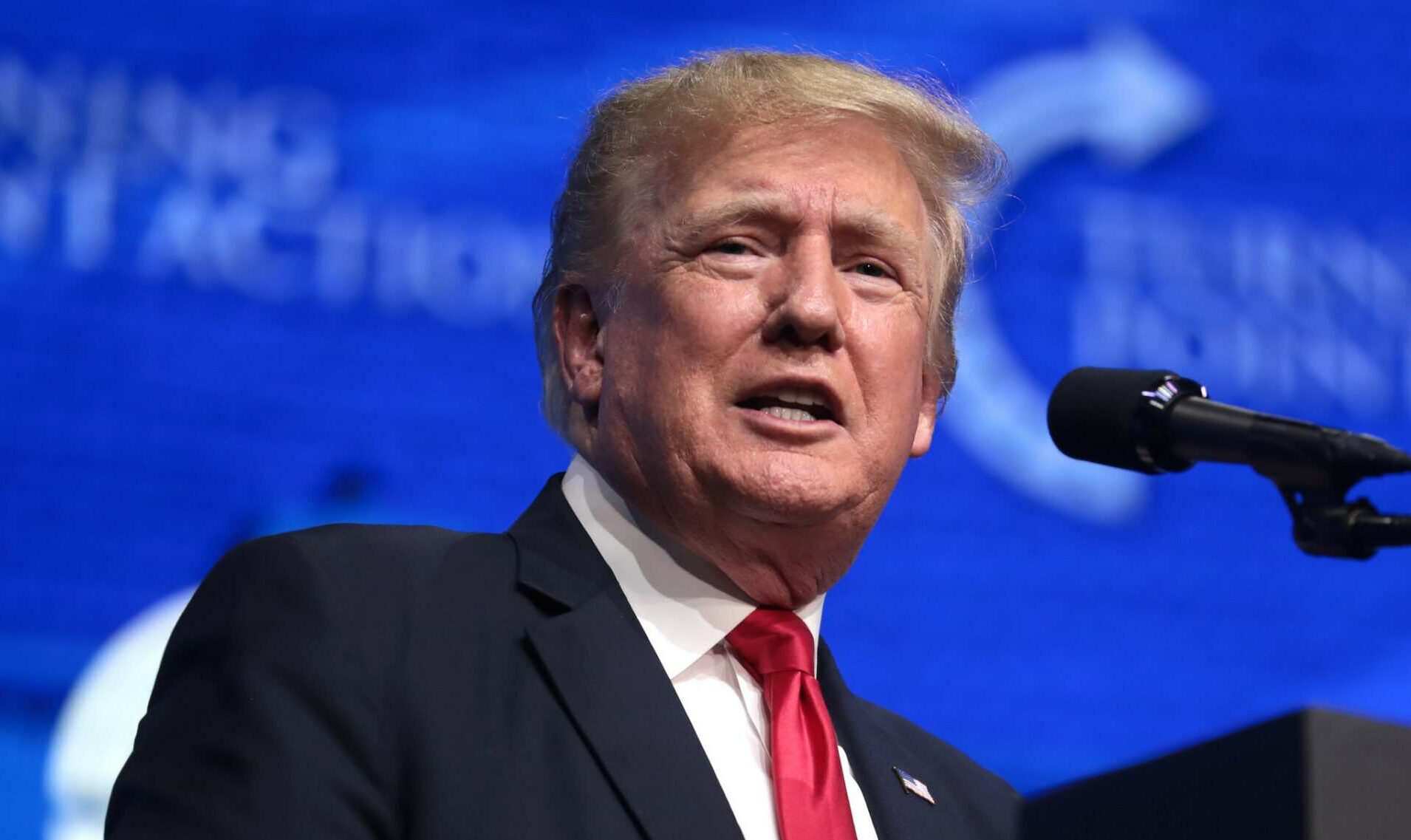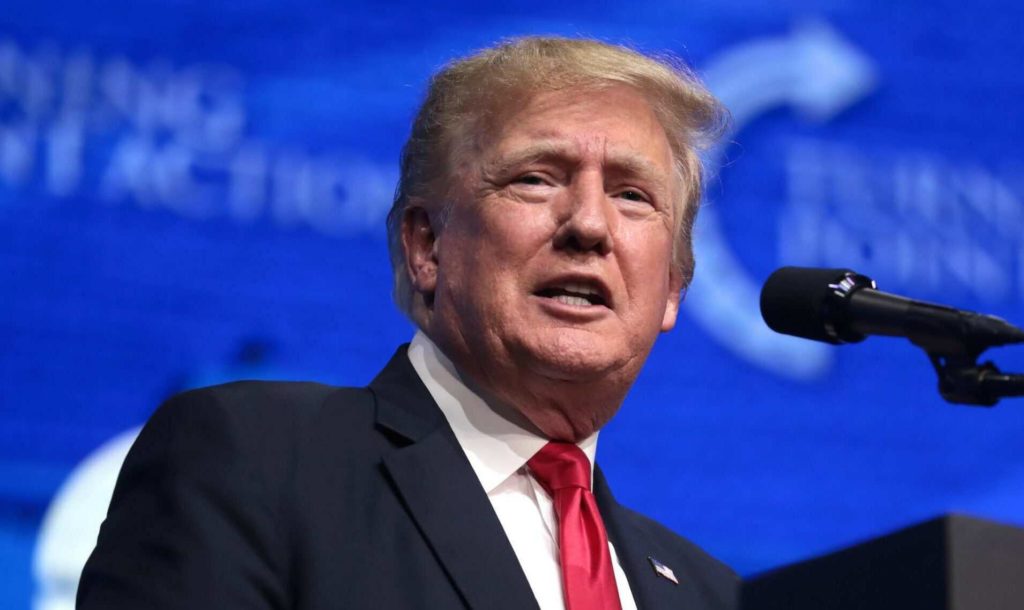
Former President Donald Trump decisively won Alaska’s first Republican presidential preference poll since 2016, with more than 87% of votes counted as of 10:30 p.m. Tuesday.
Former South Carolina Gov. Nikki Haley trailed far behind, likely falling short of the 13% threshold needed to have the pledged support of any of Alaska’s 29 delegates to the national Republican convention, where the nominee for president will be decided.
As of 10:30 p.m., Trump received 9,243 votes; Haley received 1,266; businessman Vivek Ramaswamy, who dropped out of the race and endorsed Trump last month, received 45.
Just over 10,500 votes were counted and reported in an online spreadsheet by Alaska Republican Party officials on Tuesday night, after a day of voting in which Republicans encountered long lines and confusing information.
At the Eagle River public library, dozens formed a line that snaked around the corridor 10 minutes before voting began at 3 p.m. By 3:30 p.m., more than 100 people were waiting in line. Some said they had arrived at the building earlier in the day, only to discover that voting began in the afternoon. Others said they had checked other locations before learning about Eagle River’s sole voting place.
[Biden and Trump dominate Super Tuesday races and move closer to a November rematch]
Soon after voting started, more than 100 voters were also waiting at Mountain City Church in Anchorage, one of four voting locations within Anchorage. Within the first 45 minutes of voting, 250 people had voted in that location — the assigned voting place for four out of the state’s 60 House districts.
Polling places closed at 8 p.m. after five hours of voting in Alaska, one of several states where Republicans chose their preferred presidential candidate on Super Tuesday.
The day strengthened the candidacy of Trump, who has been endorsed by Alaska Gov. Mike Dunleavy and U.S. Sen. Dan Sullivan. Former U.N. Ambassador Haley has received support from Republicans seeking an alternative to Trump, including Alaska U.S. Sen. Lisa Murkowski.
Sharon Michael, an Eagle River Republican, was standing in line when voting began at 3 p.m. She said she intended to vote for Trump, citing border security and the economy.
“There’s no secure borders, there’s no secure military, there’s no budget. People are out of work. It’s a mess. We definitely need Trump,” said Michael, then added: “if you’re looking for somebody voting for Haley, you oughtta go to the Democrat (primary).”
Several Alaska Republicans have come out in support of Haley, pointing to Trump’s felony indictments and his attempts to subvert the results of the 2020 election as reasons for opposing the former president. But with momentum heading in Trump’s direction, some would-be Haley supporters said they decided to stick with Trump.
“It’s not that he’s the best choice, but it’s the one that I was familiar with from last time,” said Jason Delong, who voting for Trump at Grace Church in South Anchorage shortly before 7 p.m.
“It was kind of a toss-up for me. Like, do I want somebody new because I think they can maybe do better, or do I go with somebody that I already know his record in the past and I can rely on that? That’s what swayed my vote. Otherwise, I would have probably picked Haley,” he said.
The poll was administered by volunteers with the Alaska Republican Party, with no involvement from the Alaska Division of Elections. Alaska Democrats will select their preferred presidential candidate on April 13.
The Alaska Republican Party last held a presidential preference poll in 2016, when U.S. Sen. Ted Cruz won, coming in ahead of Trump.
The difference between Tuesday’s poll and Alaska elections administered by state officials left many voters confused. Steve Kreinbrink arrived at the Jewel Lake Community Church of the Nazarene shortly after 5 p.m., after first stopping at two other locations where he had thought voting would take place. At the school where he typically votes in state elections, he was directed to the library. From the library, he was directed to the church.
Loren Leman, a former lieutenant governor who previously oversaw Alaska elections, was one of a dozen Republican volunteers staffing the Jewel Lake voting location. He said he had to explain to several voters the difference between state-run elections and the party-run poll, including the reduced voting hours and limited voting locations.
“We need to do a better job getting the information out,” said Leman.
Polling places were available in Ketchikan, Juneau, Homer, Kasilof, Kenai, Soldotna, Nikiski, Sterling, Anchorage, Eagle River, Palmer, Wasilla, Fairbanks and Delta Junction. That left many communities throughout the state, including the vast rural parts of the state, without a voting site. Party Chair Ann Brown said that’s because it’s an operation run exclusively by volunteers.
The party reported Tuesday that only two residents of District 2, which includes Sitka and other Southeast communities, and three residents of District 5, which includes Kodiak, voted in the poll. No results were reported from districts 37 through 40, representing rural and predominantly Alaska Native regions of the state. All of those districts lacked polling places.
Republicans could vote in polling locations outside their place of residence, but all communities in districts 2, 5, and 37 through 40 are off the road system, meaning their residents would have had to board a plane or boat to reach the nearest polling location.
Turnout in the poll was significantly lower than that recorded in 2016, when more than 20,000 Alaska Republicans participated.
[4 things to watch for on Super Tuesday]
Vote counting began after polls closed at 8 p.m. The Alaska Republican Party announced its results on a Google sheet.
The results determine the distribution of Alaska’s 29 delegates to the Republican National Convention. A presidential candidate must receive a minimum 13% of votes in the poll to receive any pledged delegates. Current results appear to indicate that all of Alaska’s delegates will go to Trump.
Delegates to the national convention will be selected in the Alaska Republican Convention in April.
___
(c) 2024 the Alaska Dispatch News
Distributed by Tribune Content Agency, LLC.
TK
Source: American Military News Rephrased By: Trump Knows
Rephrased from Trump Knows by InfoArmed
